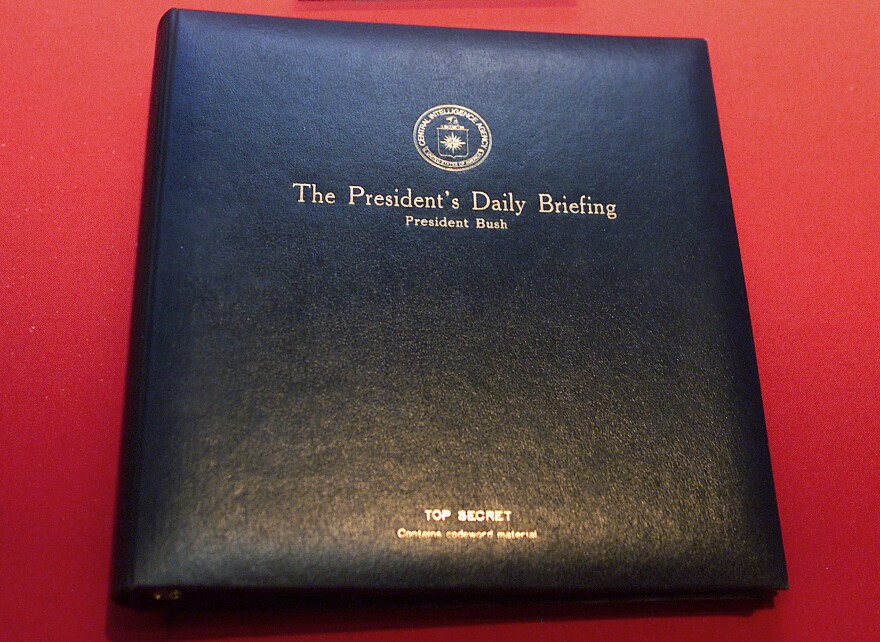As president-elect, Joe Biden should start receiving the same daily intelligence briefing as the one prepared for President Trump.
But so far, this hasn't happened, and it's not clear when the daily briefings will begin, according to intelligence officials.
Trump has not accepted the election results, and his administration has not yet authorized Biden and his team to start receiving government resources that range from the mundane — like office space and desks — to the highly sensitive, like top-secret intelligence briefings.
In the past, the government's General Services Administration issued a routine authorization letter a day or so after an election. This paved the way for a presidential transition team to start preparing for Inauguration Day on Jan. 20.
But without this letter, the Office of the Director of National Intelligence, which oversees the president's security briefings, says it is not permitted to meet with Biden's transition team. ODNI said in a statement that it "would not have contact with any transition team until notified by the GSA."
As a candidate, Biden did receive intelligence briefings, but they were limited and occasional during the hectic campaign, intelligence officials said.
A long tradition
As president-elect, Biden should start getting the President's Daily Briefing, or PDB, said David Priess, a former CIA officer.
"We've had the solid tradition since the 1960s, when the President's Daily Brief was first created, that the sitting president has offered it to the incoming president," said Priess, author of a book on presidential briefings, The President's Book Of Secrets.
Asked about the absence of intelligence briefings, Biden told a news conference Tuesday, "Obviously the PDB would be useful, but it's not necessary. I'm not the sitting president now."
But Mike Rogers, a former Republican congressman from Michigan and former head of the House Intelligence Committee, said Biden should start getting the briefings immediately.
Our adversaries aren't waiting for the transition to take place. @JoeBiden should receive the President's Daily Brief (PDB) starting today. He needs to know what the latest threats are & begin to plan accordingly. This isn't about politics; this is about national security.
— Mike Rogers (@RepMikeRogers) November 10, 2020
A new president needs to be prepared on Day 1. The U.S. is negotiating with the Taliban in an attempt to end the war in Afghanistan. U.S. forces are still in Iraq and Syria as well. The agreement that regulates the main U.S. and Russian nuclear arsenals, New START, is set to expire in February.
Priess recalled the close 2000 election, when the outcome was in doubt for more than a month after the voting. In spite of that, President Bill Clinton's outgoing administration began intelligence briefings for George W. Bush before he was officially declared the winner.
"The Clinton White House realized we can't wait forever, and they brought George W. Bush into the circle and started allowing CIA briefers to provide the President's Daily Brief," Priess said.
Bush's rival in that election, Al Gore, was already receiving briefings as Clinton's vice president.
When Trump leaves office, another question could arise: Should he still receive intelligence briefings?
By tradition, sitting presidents offer occasional briefings to former presidents. It's considered good practice for all involved. For example, when a former president plans to travel abroad, a briefing can make sure he's up to speed and doesn't say anything that would be out of line with current administration policy.
Priess said he once delivered such a briefing to George H.W. Bush before he made a post-presidential trip to the Middle East.
But these briefings are a courtesy, not the law.
Former presidents get "Secret Service protection for the rest of their lives. They get money for a staff and an office. All of that is provided for in legislation," said Priess. "But that legislation does not say that the former president has a lifelong right to receive the President's Daily Brief or other top-secret materials that they received while they were president."
Trump, of course, has extensive business interests abroad. But after leaving office, if he wants classified information on a foreign country, he'll need approval from his successor in the White House.
Greg Myre is an NPR national security correspondent. Follow him on Twitter: @gregmyre1.
Copyright 2021 NPR. To see more, visit https://www.npr.org.




